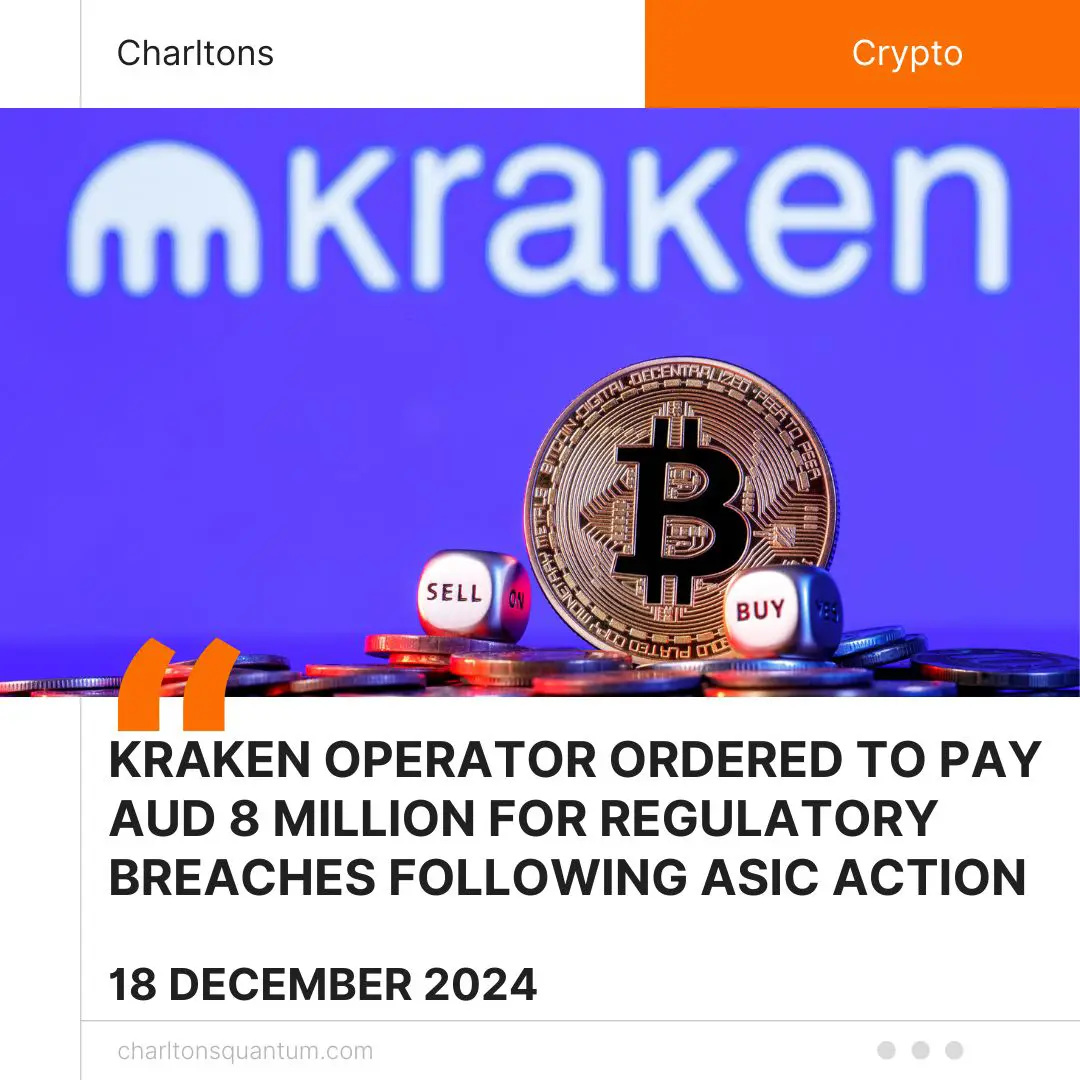
On 12 December 2024, the Australian Federal Court, in its judgment titled Australian Securities and Investments Commission v Bit Trade Pty Ltd 2024 FCA 1422, ordered Bit Trade Pty Ltd, the Australian operator of the Kraken cryptocurrency exchange, to pay AUD 8 million in penalties. The decision followed legal proceedings initiated by the Australian Securities and Investments Commission (ASIC). The Court found that Bit Trade unlawfully issued a margin trading product to more than 1,100 retail clients without meeting critical regulatory obligations under the Australian Corporations Act 2001 (Cth), as outlined in the judgment released by the Federal Court.
The ruling comes after ASIC alleged that Bit Trade failed to comply with the design and distribution obligations (DDO) when offering its “margin extension” product. This financial product allowed clients to borrow funds, either in national currencies like USD or digital assets such as Bitcoin, to trade on the Kraken exchange. The Federal Court found that Bit Trade breached its obligations by not preparing a Target Market Determination (TMD)—a mandatory document that ensures financial products are only marketed and distributed to suitable consumers.
ASIC further demonstrated that more than 1,100 Australian retail clients accessed the product from October 2021 to August 2023 and collectively incurred significant trading losses of USD 5.25 million (approximately AUD 8.2 million). The Court also noted that the company earned over USD 7.7 million (approximately AUD 12 million) in fees and interest during this period, despite failing to comply with the DDO regime.
Bit Trade, registered with AUSTRAC and operating as the Australian entity of Kraken, is a subsidiary of Payward Inc, one of the world’s largest cryptocurrency exchanges. Payward acquired Bit Trade in 2020, transferring its margin trading operations to the Kraken platform in Australia. Following ASIC’s investigation, the company was found to have inadequately assessed its legal obligations, relying on flawed legal advice regarding the DDO regime’s applicability to credit facilities.
The violations stemmed from Bit Trade’s decision to offer its margin extension product without a valid TMD following the implementation of the DDO regime in October 2021. The product enabled customers to borrow funds and amplify their trading positions, exposing them to heightened financial risk. In March 2022, ASIC began its investigation into Bit Trade, questioning the regulatory compliance of its margin products.
By August 2024, Justice Nicholas of the Australian Federal Court found that Bit Trade failed to consider its obligations under the Corporations Act 2001, even after ASIC intervention. The Court held that Bit Trade’s compliance systems were severely deficient, describing its failures as a deliberate attempt to prioritise revenue over regulatory compliance.
The Court determined that Bit Trade breached the following provisions of the Australian Corporations Act 2001 (Cth) namely, Section 994B(2), which deals with failure to produce a TMD before offering the margin extension product, Part 7.8A, which deals with breach of the design and distribution obligations, which require firms to design products that meet consumer needs and distribute them appropriately. Justice Nicholas noted that the margin product carried “a very high degree of financial risk,” enabling clients to incur losses exceeding their initial investments. He criticised Bit Trade’s disregard for compliance and remarked that the company “failed to turn its mind” to the DDO regime until ASIC intervened.
The Australian Federal Court imposed a penalty of AUD 8 million, higher than Bit Trade’s proposal of AUD 4 million, but below the AUD 20 million sought by ASIC. Justice Nicholas explained that the penalty must act as a deterrent while remaining proportionate to the seriousness and duration of the breaches. The Court also ordered Bit Trade to cover ASIC’s legal costs for the proceedings. Justice Nicholas also discussed in his judgment about the company’s failure to establish a compliant Target Market Determination deprived retail clients of necessary safeguards, leading to significant financial losses.
This case marks the first penalty imposed under Australia’s DDO regime for failing to prepare a TMD and sets a precedent for crypto firms operating in the Australian market. ASIC Chair Joe Longo elaborated on the importance of the decision, stating, “Target market determinations are fundamental in ensuring that investors are not inappropriately marketed products that could harm them. Bit Trade issued its margin extension product to over 1100 Australians who were charged fees and interest of more than US$7 million without considering if the product was appropriate for them. Those customers Bit Trade targeted suffered trading losses of more than US$5 million, including one investor who lost almost US$4 million. This is a significant outcome. It is ASIC’s first penalty against an entity for failing to have a TMD and a reminder for digital assets firms to consider their regulatory compliance obligations. ASIC believes many products offered by digital assets firms are captured by the current law, which means those products need to be properly designed and marketed to the right consumers to ensure Australians receive appropriate protections.”





